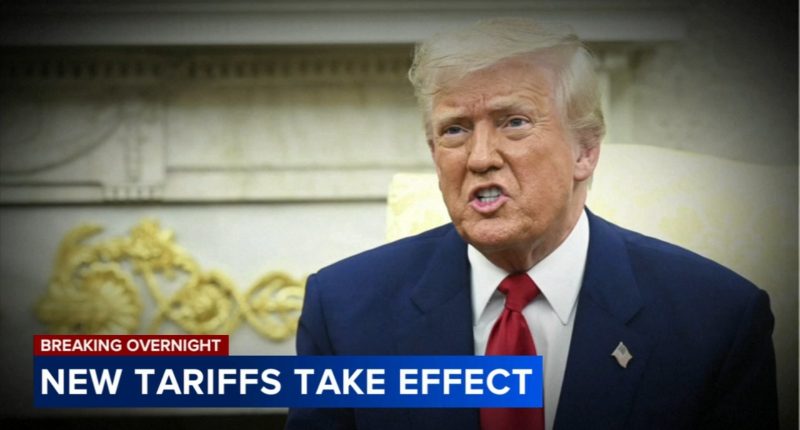A steep 104% tariff on most imports from China went into effect early Wednesday morning, along with levies on dozens of other countries — part of sweeping trade maneuvers from President Donald Trump that have roiled global financial markets.
The new tariffs were set to go into effect at 12:01 a.m. on Wednesday, one week after Trump first unveiled his “Liberation Day” tariff plan.
SEE ALSO: New tariffs could cost US importers over $700 billion in 2025
In addition to the steep levy imposed on Chinese, the U.S. is slapping tariffs on imports from dozens of other countries, including:
– 46% on Vietnam
– 32% on Taiwan
– 25% on South Korea
– 24% on Japan
– 20% on European Union countries
Under Trump’s plan, the tariff on Chinese imports was originally set at 34%. Added to an existing 20% tariff on China, that brought the total rate to 54%. After Chinese officials announced retaliatory measures, the White House said the U.S. would raise the overall rate on Chinese imports by another 50% — bringing it to a total of 104%.
The first phase of Trump’s tariff plan – baseline 10% tariffs on imports from nearly all U.S. trading partners — went into effect early Saturday.
China to take ‘strong measures’ after Trump’s latest tariffs
Chinese Foreign Ministry spokesperson Lin Jian told reporters at a Wednesday briefing that Beijing “will continue to take resolute and strong measures” in the face of the latest tariffs.
China, Lin said, “stands ready to work with all parties to uphold multilateralism” and promote “globalism.”
“We will not let anyone take away the Chinese people’s legitimate right to development,” Lin said. “We will not tolerate any attempt to harm China’s sovereignty, security and development interests. We will continue to take resolute and strong measures to safeguard our legitimate rights and interests.”
“China stands ready to work with all parties to uphold true multilateralism, jointly oppose various forms of unilateralism and protectionism, diffuse risks, address challenges and promote a universally beneficial and inclusive economic globalization,” Lin told reporters.
The imposition of tariffs, the spokesperson said, drives up costs of shipping, increases inflation, undermines global stability and “hurts” U.S. interests.
“We urge the U.S. to correct its wrong decision,” Lin added.
Copyright © 2025 ABC News Internet Ventures.







